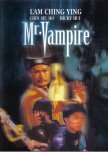
Nailed it!
Kung fu, hopping vampires, silliness, and ghostly romance---what more could you ask from a movie called Mr. Vampire? It had typical 1980’s slapstick style humor. Some of the jokes haven’t aged well but many were still able to stick the landing.Lam Ching Ying’s Master Ko is in charge of stopping a deadly vampire with only two incompetent disciples to help him. One disciple (Chin Siu Ho) becomes possessed by an amorous ghost (Pauline Wong) while the other one (Ricky Hui) begins to transform into a vampire after being bitten. Matters are not helped when a greedy rice dealer (Wu Ma!) adds regular white rice to the sticky rice needed to deter vampires. Did that suck! Master Ko uses every trick in the book to destroy the vampire. Buffy had it a lot easier. All she had to do was stake the fangers or decapitate them. Ko has to use chicken blood, ink, talismans, coated wire, sticky rice, and a host of other magical spells to try and stop the nearly indestructible homicidal hopper.
Mr. Vampire was aided by Lam Ching Ying and Chin Siu Ho having some martial arts abilities. Chin was particularly acro-bat-ic. Kung fu veteran Yuen Wah played the vampire which added to the martial arts fun. There was wire work which fit the magical atmosphere. There was a grave mistake, I spotted the wires in one scene.
What I learned from Mr. Vampire: Sticky rice slows down a vampire. A vampire can’t see you if you hold your breath. If a beautiful person of the opposite sex suddenly appears and wants to take you home on a dark night, best to make a date for coffee during daylight hours to see where it goes and whether they can appear because they may not be the ghoul of your dreams. If someone grows long blue nails overnight keep the sticky rice nearby. Hong Kong has gorillas? lol
Mr. Vampire was fun, especially if you like hopping vampires/Jiangshi combined with martial arts. As always with these older films there won’t be the high production values and CGI you see in modern films. Though you will be able to see guys hop in unison and others get set on fire. Props to Yuen Wah who was able to take the heat and his performance to the neck level!
(Trigger alerts below)
4 October 2024
TRIGGER ALERTS: A real chicken was killed as well as a snake (they made soup out of it later). There were also rats in one scene.
Was this review helpful to you?

"It will be a tasty fight!"
This is the third film I’ve watched by screenwriter Migita Masakazu and as the old saying goes, “The third time is the charm!” I wasn’t overly impressed with Monster Seafood Wars or Death Kappa. The Calamari Wrestler, however, was a strange and joyful movie about a professional wrestler who had suffered from a terminal illness and miraculously transformed into a giant squid. Could Kanichi regain his title and get his girl back? Let’s get kraken on this review!Professional wrestler, Taguchi, had always been in Iwata Kanichi's shadow until the day Iwata disappeared after being diagnosed with a terminal illness. Three years later Taguchi is the top wrestler and has Iwata’s girl. After winning the championship, a man-sized squid climbs in the ring and snatches the championship belt. It was on like Donkey Kong and the Calamari Wrestler quickly defeated his two-legged foe. Embarrassed at being beaten by a seafood wrestler, Taguchi wanted a re-match and the Calamari wrestler was all for it. The promoters weren’t as thrilled when Calamari refused to throw the next fight.
The first thing that became apparent was that in the land of Gojira and other assorted kaiju, everyone was unperturbed by a dude who had turned into a cephalopod and who didn’t have to stay in water. I squid you not. Calamari shopped at the markets with no one running for their lives. In fact, when the fight was called off, the people rallied around him and pressured the promoters to schedule him a fight with Taguchi. Kanichi’s old girlfriend, Miyako, decided she was still in love with him regardless of his tentacles or maybe because of them. A whole sub-genre of manga came to life (without any gratuitous scenes).
There was an effort at social commentary in this squidiculous film. The promoter believed Calamari represented the chaos of the world and when Taguchi defeated him, it would alleviate public anxiety. Gradually, the public convinced him that by letting Calamari into the ring it showed that a world without prejudice could exist. The people just wanted to see exciting fights regardless of how many legs the opponents had. And soon there were other seafood wrestlers joining Kanichi in the ring.
This felt like a Rocky movie if Rocky was a squid and instead of boxing it was pro-wrestling. Coinsquidentally, Calamari had a Rocky moment right after his fight. There was even a training montage! All of the characters showed their devotion and love for pro wrestling. The film also highlighted the less savory side of the sport, I mean show, with the promoters working every which way to make a buck off the wrestlers and the fan’s desire to see blood in the ring. The special effects were almost nil. You could sea the human legs below the tentacles and squid costume which was actually part of the film’s charm.
Calamari Wrestler wasn’t inkredible but it was entertaining with gentle humor, as gentle as a reverse suplex or powerbomb. The wrestling scenes were hilarious and the final fight had a reveal I didn’t see coming. Normal issues such as love, greed, and national pride played out behind the tentacles and ink. If you enjoy absurd movies and don’t need a pesky thing like logic, this might be one to try.
1 October 2024
Was this review helpful to you?

Hopping Vampires!
I thought that I’d been led astray in my research of hopping vampire movies when I began Era of Vampires aka Vampire Hunters. The first creature of the night was a super powered blood sucking vampire that did not so much as hop, jump, or skip. Later on, my patience was rewarded when a whole herd of hoppers appeared. This was a low budget Hark Tsui produced film of which I expected more yet still found enough to keep my attention.Be very, very quiet for Wind, Rain, Lightning, Thunder and their sifu Mao Shan are hunting a vampire. This mostly dead ex-general was juiced up and took exception to the vampire hunters. Many of the red shirt hunters were killed and Mao Shan was feared dead as well. Three months later the weather crew followed their vampire compass to the Jiang residence on the day of a wedding. The Jiangs were experts in making and using wax which led to some uber creepy goings on in a house where things didn’t just go bump in the night but also hopped and slithered. A secret stache of gold, a greedy brother-in-law, the Vampire King, the hunters, and the macabre household would all eventually collide in one gory mess.
This film had a very low budget look to it. The sets were simple but made to appear frightening with blue lighting and copious amounts of smoke masquerading as fog. The Vampire King was gruesome and buggy, no sexy fang banger here. Two of the humans did have time for some romance while running away from and fighting vampires. Even though there was some gore, the special effects were extremely low tech which took away much of the fear factor.
I didn’t recognize the Phoenix from Eternal Love TMOP at first. A young Ken Chang played Thunder and had the most screen time. Old martial arts movie star Chen Kuan Tai showed up as a Taoist corpse wrangler and set the hoppers loose at one point to distract the hunters while thieves sought out the golden treasure. He was even able to show his kung fu stuff in a short fight with one of the baddies. There were several wire-fu fights in dim lighting that weren’t as creative as I would have liked but were okay for this film.
Era of Vampires was more reminiscent of early kung fu films than films from the same timeframe. It had some intriguing moments and for this bargain basement niche mixed genre of martial arts and vampires it held its own.
30 September 2024
Was this review helpful to you?

Table for Two
Before Harry Met Sally, Figgy and Jenny met in An Autumn’s Tale. Mabel Cheung directed this romcom from a script by Alex Law. Set in New York City, it showed some of the obstacles Figgy and Jenny had to overcome on the way to love and the American Dream.Jennifer Lee flies from Hong Kong to NYC in order to go to acting school and be with her boyfriend, Vincent. Her cousin Samuel Pang aka Figurehead aka Figgy greets her at the airport and gives her a ride in his deathmobile to her new apartment. Jenny’s mom had been informed that Figgy was a very successful businessman with his own apartment and car. Technically, all those things were true, if exaggerated. Vincent gave her a worse surprise than riding in Figgy’s junker. Unmoored and not sure what to do, Jenny went to school and picked up two part-time jobs to make ends meet. When Figgy wasn’t working or gambling he spent time with her, helping her overcome a broken heart and also had to make a better bowl of fish soup.
This film may have smacked of a tried-and-true romcom formula, but it was a newer trope nearly 40 years ago when this film came out. Even at that I found it entertaining and well done. The film eschewed secondary characters for the most part and focused on Jenny and Figgy which helped deepen my bond with them. Both were flawed, likeable characters trying to find their place in the world. Chow Yun Fat gave a delightful performance as the good-hearted Figgy who always helped a friend in need. This was the most vulnerable I’ve seen him. From joyous to down crested, he made Figgy believable and sympathetic. The younger Cherie Chung held her own with him as Jennifer. The two had nice chemistry going from strangers to something more even when Jenny and Figgy weren’t sure exactly what that something more was.
NYC was shown from its dirtiest closet to its shiniest showroom. Jenny went from being unsure of how to navigate the city to gaining her confidence with each passing day. Unlike Figgy, Jenny not only hung out with Cantonese speaking people, she also made friends at her school. Though ten years older than her, it was Figgy who needed to gain the confidence required to meet his goals. The two characters helped each other to grow and figure out what they wanted in their lives and each other.
An Autumn’s Tale was a subtle and slow burn romance without any annoying melodrama or slapstick comedy. Even the misunderstandings were overcome quickly. What it did have was character growth and personal discovery for both Jenny and Figgy. Their endearing relationship and adventures made the trip to NYC worthwhile.
25 September 2024
Was this review helpful to you?

"Sometimes I have to follow what others do. I don't know why life is this hard"
All the Crows in the World is a short film by Tang Yi that won the 2021 Palme d’Or Best Short Film and the 2022 SXSW award for Narrative Short. A clever satirical look at “respectable” businessmen and also a warm take on how friendships can occur in the strangest of places. Tang Yi built her world, added some surreal elements, and let her sharp female lead navigate it with care and fun.Zhao Sheng Nan and her friend are enjoying a snack when the shop owner takes off with a female “friend” before his wife comes back. Sheng Nan starts a stopwatch and bets how long he’ll last. A relative advises her with a bullhorn that her cousin wants to meet up with her. At the restaurant table filled with middle-aged businessmen she finds herself, her virginity, and her marriageability the center of conversation. A conversation that includes a Taoist priest. She’s also gifted numerous red envelopes. The party moves to an “entertainment” establishment where numerous girls in short dresses are introduced. Sheng Nan finds a safe harbor with Wang Jiang Guo who has no interest in women or the evening’s proceedings.
Shot on a small budget, Tang Yi was the writer, director, and cinematographer. She utilized her 14 minutes and managed to make Sheng Nan and Jiang Guo come to vivid life, also helped by the actors’ performances. Though teenage Sheng Nan still had an innocence about her, with each zip of her jacket she showed that she was also aware of what men’s eyes desired. And was confident enough to put the businessmen in their places. Unlike the mainland where gay love is verboten, this Hong Kong film had an openly gay character. Jiang Guo and Sheng Nan formed great co-conspirators as they found their own way to enjoy their evening.
I enjoyed this quirky short film which even found time for a quick dance number complete with wings, bubbles, and strobe lights. Sheng Nan and Jiang Guo’s developing friendship was entertaining to watch as they commiserated with each other and poked fun at the respectable people around them. Tang Yi is a fresh voice and one I want to hear more from.
24 September 2024
Was this review helpful to you?

"Every place is the same"
Xiu Xiu the Sent Down Girl was a haunting and angry film set during the Cultural Revolution. The Tibetan steppes with an ocean of green and endless blue skies belied the ugliness taking place in a small, ragged tent.Xiu Xiu waves goodbye to her family as she and other youth from her community are sent to the “countryside” during the Cultural Revolution. At fifteen years of age she is assigned to work with a horse herder in order to learn the skills to come back in six months to lead the Iron Girls Cavalry. Lao Jin is a skilled horseman who understands the land he lives on. During a battle twenty years ago he was castrated, something none of the local men let him live down. Xiu Xiu doesn’t care for her remote assignment but gamely works with Lao Jin in the sun and rain. When the six months come to an end, homesick Xiu Xiu packs her belongs and eagerly waits to be picked up. The bus home never arrives. One by one men come to her and convince her that they can help arrange her permission documents if she will give them the favor of using her body. Desperate to leave the steppe and return to her mother and father she opens herself to the degenerate men while slowly and surely her hope and dignity begin to ebb away.
This was an infuriating movie to watch. Director/writer Joan Chen left most of the politics out and focused more on human nature. Xiu Xiu was a naïve child who wanted to go home. The vast steppe wasn’t freedom to the teenager, more like being stranded on a desert island. As evil men do who have power over women or in this case a beautiful teen girl, they took what they wanted offering empty promises in return. Like the child she was she committed to the only path she could see that might help her escape. Lao Jin allowed her to make her own choices even when he saw how disastrous they were. Only when something happened that wasn’t her choice did he spring into action.
The connection between Xiu Xiu and Lao Jin was engaging. The difference in age was substantial which Lao Jin respected if the men at headquarters did not. He cared for her more as a ward than possible love interest. Xiu Xiu tended to boss him around yet Lao Jin tried to make her as comfortable as possible. Li Xiao Lu (Lu Lu) and Lopsang gave natural heartfelt performances that drew me in as the mismatched work couple.
Both Joan Chen and the author* of the novel this film was based on lived during the Cultural Revolution which gave them some basis for their artistic endeavor. Watching a child willing to do whatever was necessary to break through the corrupt bureaucratic red-tape and institutional abuse of human rights and dignity was devastating. Joan Chen took advantage of the stunning scenery and cloudy skies as the backdrop for the film. Even when human darkness began to erode Xiu Xiu’s self-worth the sun shone brightly. The juxtaposition was jarring. With these kinds of films I worry that they can be more exploitive than revealing. Instead, there was a coiled fury underlying the manipulation and mistreatment of a child who had no money, no power, and no knowledge of the ways of the world. The Cultural Revolution didn’t have a monopoly on those vices. To quote Lao Jin, “Every place is the same.” Every place is the same when those in power are free to do as they will to those with less power.
31 August 2024
*Yan Ge Ling wrote the short story Celestial Bath in 1981
Was this review helpful to you?

"Who can throw a stone?"
Love Letter was actress Tanaka Kinuyo’s first film to direct. WWII was over and the censors had left so she could address sensitive issues about American G.I.’s having Japanese lovers. The subject for her first film was a tough one and the 1950’s attitude of the male lead was difficult to sympathize with.Five years after WWII, Reikichi lives with his younger brother, Hiroshi, who pays most of the bills. An old friend brings him into his business translating and writing love letters in English for women who have been involved with American soldiers. Most of the women are asking for money and Yamaji makes the letters flowery and eloquent. Reluctantly, Reikichi begins work there to bring in more money. He’s despondent because he has never forgotten his first love who married someone else. When he discovers that she’s a widow he goes to the train station every day to search for her. As luck would have it, she comes into the shop to have a letter written to an American soldier who had fathered her baby.
First the positive. I enjoyed Tanaka’s fluid directorial style. Despite the year and cultural values, she showed Michiko in a mostly sympathetic light. Mori Masayuki gave a wonderfully complex performance, even when I wanted his character to erupt in flames. Yuga Yoshiko brought a damaged, yet sweet spirit to Michiko. Michiko was a woman who had lived through her own hell and was still able to be kind to others. The supporting characters were also strong. Tanaka made a guest appearance as a woman needing a letter written by Reikichi but instead received an earful about her lifestyle from the sullen man.
Much was made of Reikichi’s loyalty in waiting for Michiko for five years. They made a point of him standing next to the Hachiko statue, the dog who had waited faithfully for his deceased owner every day at the station for nearly 10 years. For Michiko to have sullied herself with a foreigner from the country that had defeated them was too much and the diatribe Reikichi buried her in was vile. That she’d also given birth to a “blue-eyed baby” who had died made her acts even worse. He knew nothing about her and the struggles and pain she had faced. He was unable to comprehend that the man she’d been involved with had been what she needed at the time. This kind of overly precious attitude about women’s virtue struck me as false given the horrors the Japanese military committed against women during the war.
What saved this film for me was that both Hiroshi and Yamaji called Reikichi on his stupidity and stubbornness. “Who do you think you are? A saint? You can’t be proud of the way you lived.” They knew that the war years and post war years were brutal for women, especially single women without a family to support them. For Hiroshi, Michiko’s actions could be forgiven as she had only been with one guy, unlike the prostitutes who made a living off the white bread foreigners. Michiko was a kind and elegant women who condemned herself for being “depraved” which was awful to hear. Reikichi wasn’t exactly a great catch. Though well educated he’d been sponging off his brother since he came home.
Japan had much to process after the war. Soldiers had experienced traumas and civilians had lived through their own. Most people had either visible or invisible battle scars. Reikichi was learning the hard way that forgiveness was hard to come by and sometimes harder to give when clinging to rigid ideals.
30 August 2024
Was this review helpful to you?

"Everyone has their limitations"
Director Marilu Diaz Abaya crafted a daring film about four female friends in 1982. Moral talked about martial law under Ferdinand Marcos while he still held power. There were frank discussions about premarital sex, married sex, sex between men and women, men and men, and women and women. One character spent as much money on weed as she did on cigarettes. Marital rape was brought up as was abortion. No subject seemed to be taboo in Ricky Lee’s script.Pregnant Maritess and Dodo tie the knot in the opening scene with guys taking bets on how long the marriage will last. Present at the wedding are Maritess’ best girls-Kathy, Sylvia, and Joey. Maritess moves into a large house with Dodo’s even larger extended family. Kathy is determined to become a famous singer and isn’t afraid to use any of her wiles to make it happen. Sylvia is a divorced mother with a child around 5 years old. She still loves her ex, Roberto, but Roberto loves Celso, a dancer at a gay bar. Finally, Joey is adrift with no place to call home spending the night with whoever will take her in. She dulls her emotional aches with marijuana and sex with strangers. Her heart belongs to Jerry, who is heavily involved with the fight against the government and is in love with Nita. The women are about to graduate from university with many decisions personally, professionally, and socially to come to terms with.
There were less love triangles and more love conga lines. At one point, teacher Ernie loved Sylvia, who loved Roberto, who loved Celso, who loved sleeping with other men. Sylvia’s relationship with Roberto and Celso was the most endearing. The three became emotionally involved if not sexually. Maritess found herself repeatedly pregnant and caged in a house with 20 children with little say in her life. Like a trapped raccoon she was ready to chew her arm off to escape. The price for fame began to take its toll on Kathy as it became more apparent she wasn’t a very good singer. Joey lagged behind the others in growing up until she hit bottom and had to make some hard choices.
Moral showed the moral choices the women had to make that were breaking new ground in a conservative society. Sylvia was deemed immoral for not wearing a bra to work, imagine the horror if someone found out she shared a bed with two men. Joey was talked about for being promiscuous, something that was a right of passage for male students. Kathy slept with a woman in order to further her career. Maritess had to decide whether to be a voiceless babymaker or stand up to have a life of her own. All four women were three dimensional characters who had their own growth arcs. The men were not vilified though some of them behaved in the entitled way they were accustomed to in 1982.
Scenes from the film were censored for being offensive to the army, not surprising with two characters actively involved in the New People’s Army. Moral was not a box office success or one with the critics back in the 80’s. Over time people were able to see its groundbreaking themes and emphasis on women’s challenges and lives in a changing society. The negatives of the film were badly degraded, damaged by time and mold. L’Immagine Ritrovata spent 2600 restoration hours working to salvage it with the restored film being shown in 2017. There were still some issues but nothing distracting.
Even here near the end of 2024, films about women, directed by women are all too rare. In 1982 I cannot imagine what it took to get this film made and distributed. Especially a film where women were the powerful agents of their own lives. No wonder it didn’t get a positive reception, Marilu Diaz Abaya and Ricky Lee were treading on new territory and it would take time for people to catch up with them. The film had its flaws and some performances were stronger than others, but given its age and the courage to make it I was generous with my rating.
Favorite line---“Next time you see Ernie, tell him his mother is a whore.”
29 August 2024
Was this review helpful to you?

"Once you see hope, embrace it!"
I went into Last Night trepidatiously given the subject matter. Suicide is far too serious and complex a matter to take lightly. This film had mixed results with how it broached the topic. In this particular story, the motivation was sudden catastrophic changes in life and not long-term clinical depression which made the movie’s approach more palatable.Mark is about to jump off the Jones Bridge when he hears a woman calling for help. Carmina’s sweater is caught on the sign below in a failed suicide attempt. They end up agreeing to die together and begin attempting different ways but are continually foiled.
This was a tale of two movies for me which made it hard to rate and hard to watch at times. As I was slogging through the first half of this film, it was sitting at a 5.0 for me, largely because of the character of Carmina. Everything Toni Gonzaga’s character did was over the top, cringe-worthy, and annoying. Even Mark asked Carmina, “Are you a child? Do you always have to be entertained?” Piolo Pascual’s Mark was more reserved and felt like he was in a completely different movie. The suicide attempts were more farcical than saddening. Long before the half, I’d figured out the upcoming twist and was waiting for it to be revealed. The second half was more engaging and the comic acting was toned down. The cinematography and music were actually quite good and put to much better use as the film went on.
If you enjoy Gonzaga’s comic routines you will likely enjoy this more than I did, I tend to be hypersensitive to overt comic acting, especially with a serious subject matter. Without any spoilers, the ending was satisfying and I did enjoy her acting later in the film. If suicide is a trigger or the Catholic view of it troubles you, best to skip this one.
26 August 2024
Was this review helpful to you?

"Are you happy?"
Autumn Moon was a melancholy story of three lives in transition set in Hong Kong. The blue filter gave an added layer of existential angst to a 25-year-old Japanese traveler, a 15-year-old girl readying to meet her family in Canada, and her grandmother who knows that won’t be the trip she’s making.Hong Kong teenager Lee Pui Wai and Japanese traveler Tokio meet on a bridge where he’s fishing. Tokio’s looking for a great place to eat, having been let down by his guidebook. Wai takes him to her favorite restaurant---McDonald’s. Later she brings him to the home she shares with her grandmother. Wai and Tokio communicate in broken English but Grandma doesn’t speak any and aside from asking his name, generously feeds him. Wai and Tokio strike up a friendship sharing their life experiences and the difficulties they are going through.
I was concerned this would be an age-inappropriate romance but there wasn’t a hint of romance between Tokio and Wai. Tokio had become involved with an older woman and Wai was in love with her classmate. Tokio went through women like a giant Pez dispenser. The casual sex didn’t bring any satisfaction, only reinforcing his alienation from society and himself. Aside from her grandmother, the rest of Wai’s family had already emigrated. Most of her friends had left Hong Kong as well. Once her family found a house, she would be moving. Grandma was the odd person out, unable to emigrate due to her age. The only trip she was planning on was to the Goddess of Mercy.
The available version of this movie that I found was badly degraded and cropped for television. Visually, I could see the potential spoiled by graininess and wavy lines. The dialogue could also be hard to follow when the friends were speaking broken English as there were no subtitles during the common language scenes. What still held up well was Tats Lau’s music which ranged from playful to mournful and always hauntingly beautiful.
Director Clara Law filmed the leads on different locations around Hong Kong. Though the crowded city is usually shown packed with people, Wai and Tokio always seemed to be alone. Surrounded by the unseen people and crowded buildings, they were desperately isolated in worlds of their own. The two suffered from having “trapped hearts”, unable to break through the barriers. Tokio wanted someone to get to know him instead of his 'wham, bam, thank you mam' anonymity. Wai struggled with being separated from her family and friends. Yet she wasn’t prepared to say good-bye to her grandmother and her home. She was also dealing with the complicated feelings first love creates in a young girl's heart and body. Grandma’s legacy lay in the refrigerator filled with secret, sacred ingredients that would no longer be needed.
Three generations of people and two different cultures were lovingly and respectfully shown. The characters dealt with loss, soul shattering boredom, and the unknown. Through their friendship and a private celebration of the Mid-Autumn Festival, Tokio and Wai would discover how to revel in the small moments and find the courage and contentment they would need to travel the paths that led to happiness.
“When will the spring flower and autumn moon fade,
How much of the past do we know?
At my home last night the East wind blew…”
21 August 2024
Was this review helpful to you?

"The society is harmonious but I am bullied!"
Director Zero Chou gave a Taiwanese interpretation of how mainland Chinese gay couples are received in We Are Gamily. Her view of the complexities of loving someone that a conservative society will not accept was important but I found the interpretation on the screen lacking.“Any conflicts and unharmonious relations existing in a society, require us to actively harmonize them to achieve a stable, harmonious, and orderly outcome.”
Wu Gang and Yang Duo are both in relationships that their families would never approve of and that are not believed to contribute to a harmonious society. Gang and Sam have been lovers for over three years as have Duo and Liya. In order to get both of their families off their backs, Gang and Duo marry but continue to live with their lovers. Their plan goes array when their mothers decide they need to have a baby as soon as possible and Gang’s mother moves in with them to push the matter along. How having a live-in mother pressing a couple to have sex would enhance their performance is something I don’t want to know. Neither Sam nor Liya are happy about the new living situations. Complicating matters, Gang’s lesbian sister Rou moves in as well.
The comedic set-up had possibilities but didn’t work for me. The writing, acting, cinematography, music, and sound were all a “C” at best. Ang Lee made a similar movie nearly 25 years before this one on a shoestring budget that delivered a more emotional punch. In a two-hour movie, We Are Gamily had very little character development. Gang and South African Sam had been together for several years but all I knew about them was that they loved each other and had a penchant for phallic shaped art. Duo and Rou had similar development issues, but at least we were told what they did for a living. Ruo and Sam were both ready to rock the boat, while Gang and Duo were more concerned with their mothers’ acceptance.
Gamily started out with a comedic tone and then morphed into a more serious one as the couples began to wonder when they could stop acting and start living their lives. I found it hard to become emotionally invested in the story as Rou and Sam were dragged into the play neither wanted to act in. Rou was the character I could most connect with. She accepted who she was and was willing to live away from home in order to be honest with herself, even if she couldn’t be honest with her family. When societal harmony was brought up, she replied, “The society is harmonious, but I am bullied!”
We Are Gamily was a lighthearted look at a serious subject about being different and upsetting familial and societal harmony, when the lack of “harmony” or sameness should never have been the responsibility of those being judged. The social and familial commentary were elements to appreciate about this film. However, the overly contrived situations, poor camera work, and often terrible sound challenged my attention span.
14 August 2024
Was this review helpful to you?

"We're just like everybody else"
37 Seconds was billed as a sexual liberation story for a young woman with cerebral palsy. While the film acknowledged that Yuma had desires like any other woman, for a film often set in the red-light district it was surprisingly chaste. This was a coming of age film as Yuma sought to break free from her mother's control and explore the world that couldn't see her as a real woman.Twenty-three-year-old Yuma leads an insular and highly controlled life. She works as a manga artist for her friend, Sayaka. What the world doesn’t know is that Sayaka can’t draw or write stories, Yuma does it all. Sayaka merely plays the part on YouTube and keeps Yuma a well-guarded secret. At home, her mother cares for and treats her like a child refusing to let her have long hair, use makeup, or wear dresses. When Yuma attempts to sell a manga idea she’s told to stop copying Sayaka’s work and be unique. She ends up at an erotica manga publication. The editor likes her work but tells her she needs some sexual experience to understand what they want. Yuma starts breaking free from her mother and Sayaka when she meets sex worker Mai and her assistant Toshi on a trip to the red-light district. Her new friends encourage her to explore what she likes and not be afraid to try new experiences. Advice her mother will absolutely not agree with.
This film was decidedly aided by hiring Kayama Mei, a woman who has cerebral palsy, instead of an actress mimicking what she thinks CP looks like. Kayama with her delicate voice showed Yuma's resolve as she fought to live her life for herself. Yuma wanted to be seen and heard, something her mother was afraid of. A gifted artist she was closeted away by her “friend.” The film bestowed Yuma with enormously helpful new friends which may not have been realistic but they provided her a gateway to independence. There were a couple of adult moments if you are sensitive to such subjects, when Yuma attempted to hire a sex worker and later when she and Mai visited a sex toy shop. Films about people with handicaps can be condescending and patronizing. 37 Seconds managed to avoid those pitfalls. Soft spoken Yuma demonstrated to herself and others that she was strong and despite her physical limitations, she was just like everyone else. Her transformation as she gained confidence was beautiful to watch. I loved Mai’s words to her, “You’ve taken a big step. Better not f*ck it up.” Of course, most of do on occasion whatever our life circumstances.
Yuma made friends, carved out a professional path for herself, gained independence, and even had an adventure to Thailand. She learned that sometimes you need to know where you’ve been in order to figure out where you want to go. 37 Seconds can be gone in an instant or its effects can last a lifetime. The memory of this tender, unique coming of age film will linger far longer than the title.
13 August 2024
Was this review helpful to you?

Could have used more rom and more Tang Wei
Despite starring Tang Wei and Jacky Cheung, this ended up being Jacky and Pau Hei Ching’s movie. Tang Wei was criminally underused. Crossing Hennessy was a scrambled ensemble that too often pulled focus from the main couple.Loy is a 41-year-old man who sleeps until noon and has difficulty with responsibility. His mom owns an appliance store where he fixes equipment and does installs near as I could tell. His aunt dotes on him while his mom berates everyone around her. Queenie, the mom, sets him up for a matchmaking dinner with the woman whose uncle owns a shop across the street. Oi Lin, much like Loy, has no intention of following through with the match. She has a jailbird boyfriend and Loy is seeing his ex-girlfriend. Later, after meeting coincidentally the two find they share an interest in mystery novels. Kismet! Queenie, family friend Uncle Ching, and Loy’s aunt end up in a love triangle of their own.
I watched this film mainly because Tang Wei was starring in it. Before the hour mark she all but disappeared from the screen until the end of the film which was quite disappointing. Her character was given little to do overall. I also struggled to understand what thirty-year-old Oi Lin would see in a forty-year-old man (49-years-old in real life) who had no direction and nothing to offer her but the ability to make her laugh. Jacky Cheung’s acting style is not my cup of tea. I find his mugging for the camera and eyerolling more annoying than cute. It was difficult to understand what lit the attraction between Oi Lin and Loy. Pau Hei Ching as Loy’s mother was continually loud and overbearing with no nuance. I kept waiting for her older sister to finally snap after being continually rundown by the family diva. I only know Danny Lee from old kung fu movies so it was interesting seeing him as the henpecked, dog carrying Uncle Ching. The veterans’ love triangle dominated the second half of the film along with Loy’s challenges while Oi Lin sold toilets offscreen in her uncle’s shop.
Crossing Hennessy had some cute moments but then the film would go in another direction leaving the burgeoning romance on the backburner. Tang Wei’s return to film after being blacklisted (apparently, she did those spicy Lust, Caution scenes all by herself? None of the men suffered any consequences) should have highlighted her acting abilities instead of sidelining her in her own romance. Jacky Cheung’s hangdog, lazy character and verbally abusive mother weren’t interesting enough to carry the film for me.
8 August 2024
Was this review helpful to you?

The plot bounced all over the place at the beginning. It didn’t help that the copy I saw was faded with white subtitles over the pale images. A relief fund of 8000 silver coins was stolen from robbers who hit the convoy during the transport. During the melee, the chief escort officer was killed with a bamboo machete. Local crime boss Tsang had ordered the robbery and thought that bamboo boss Chin hit the escort, stealing his plunder in order to pay back money he owed. The actual robbers hid the money on Boss Chin’s land until things settled down. Tsang wanted Chin’s daughter, Lin Tang, to marry him, something she had no intention of doing. And finally thrown into the mix was Pao Liang, the younger brother of the murdered escort chief. Pao strolled into town determined to bring the killers to justice.
Chang Yi starred as Pao Liang, a rare good guy role for him. Chen Chen played the feisty Lin Tang who wasn’t afraid to fight anyone. Chen Hung Lieh who was always assigned the villain roles due to his resting bitch face played the smarmy crime boss Tsang. Wang Yung Sheng did the choreography which would have been challenging with some of the non-martial arts actors. Chang Yi had studied some and performed several impressive jumps. The stuntmen had their work cut for them as most of the fights were big gangs against one or two. They had to sell the limited abilities of Chen Chen and Chen Hung Lieh by flipping, falling, and soaring through the air. During the finale with Chang Yi against the world not a piece of furniture was spared in the gambling den as stuntmen flew over the balcony repeatedly and through the walls. The problem with these grand scale fights was that all the moves began to look the same.
If you are a fan of old kung fu films, The Cannibals is watchable. There were some cute moments with the child actors and flirtatious moments between Pao and Lin Tang. The fights and acting were average for the time frame as was Ni Kuang’s story. It just lacked any kung fu charisma. Chang Yi was always more compelling as an OTP villain.
4 August 2024
Was this review helpful to you?

"Families should eat together"
The House of Us was the second full length film by director Yoon Ga Eun. This time instead of the universal theme of rejection and fitting in, she tackled how three little girls dealt with the instability of their family lives. I enjoyed this film but felt unlike the realistic portrayals of her first film that this one veered off into fantasy by the end.Ha Na had just won the Good Classmate award at the end of the school year. Unfortunately, her family wasn’t terribly impressed. More than anything Ha Na wanted the family to eat dinner together and take a trip to the beach together. Her parents were far too busy and distracted to agree to a trip. When they were home the adults spent most of their time screaming at each other. Her older brother didn’t have the time or patience for Ha Na either. Ha Na ended up making a family of her own with two little girls she met who lived by themselves. Yu Mi and Yu Jin’s parents worked at a beach hotel and their uncle was supposed to be looking after them but he was absent most of the time. Ha Na cooked meals for the girls and helped them scare off potential renters for their apartment. They worked together to build a House of Us made of decorated boxes and egg cartons. Ha Na’s overwhelming desire for her family to take a trip together led the three children on a potentially dangerous adventure.
Yoon delved into fractured families and how children processed that information. Ha Na thought if only the family gathered around the table or on a vacation reconciliation could occur. Her little friends Yu Mi and Yu Jin believed if they kept someone from renting their apartment they wouldn’t have to move for the 8th time. Ha Na tried desperately to keep both homes and families intact in a way only a child would attempt.
As much as I liked the core story of the film I wasn’t as enamored with the narrative structure housing it. Yoon used a deux ex machina in the final quarter when Ha Na selfishly put the girls in danger despite having a logical way out. While the child actors were engaging, I never felt emotionally connected to them. House of Us didn’t shy away from the price dysfunctional parents have on children. Ha Na had to learn the painful lesson that families and made families can’t always stay together physically but can stay together in their hearts. Yoon Ga Eun crafts such interesting works of heartfelt art, I hope she is given the opportunity again in the near future.
3 August 2024
Was this review helpful to you?

 54
54 188
188 11
11






















